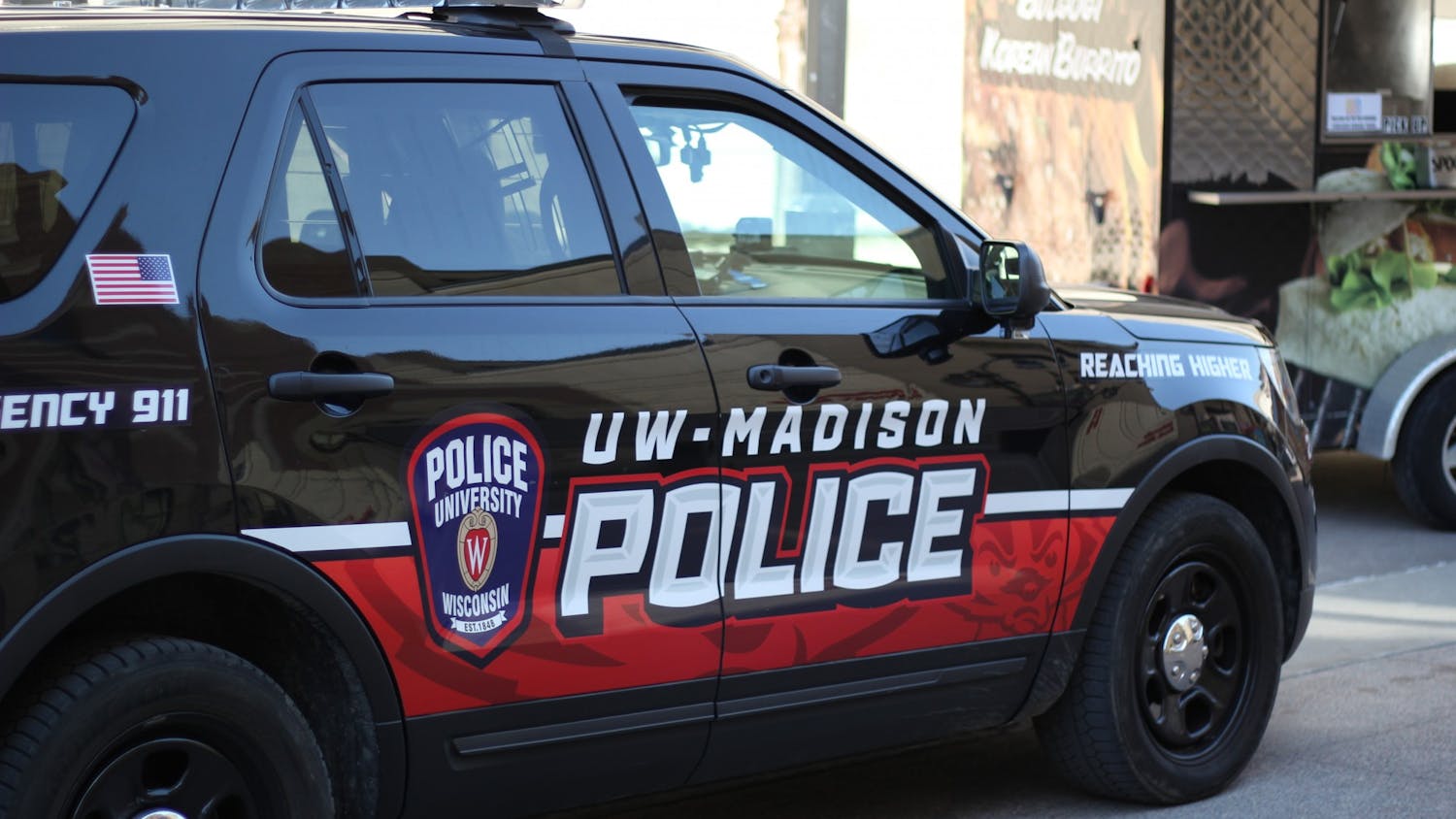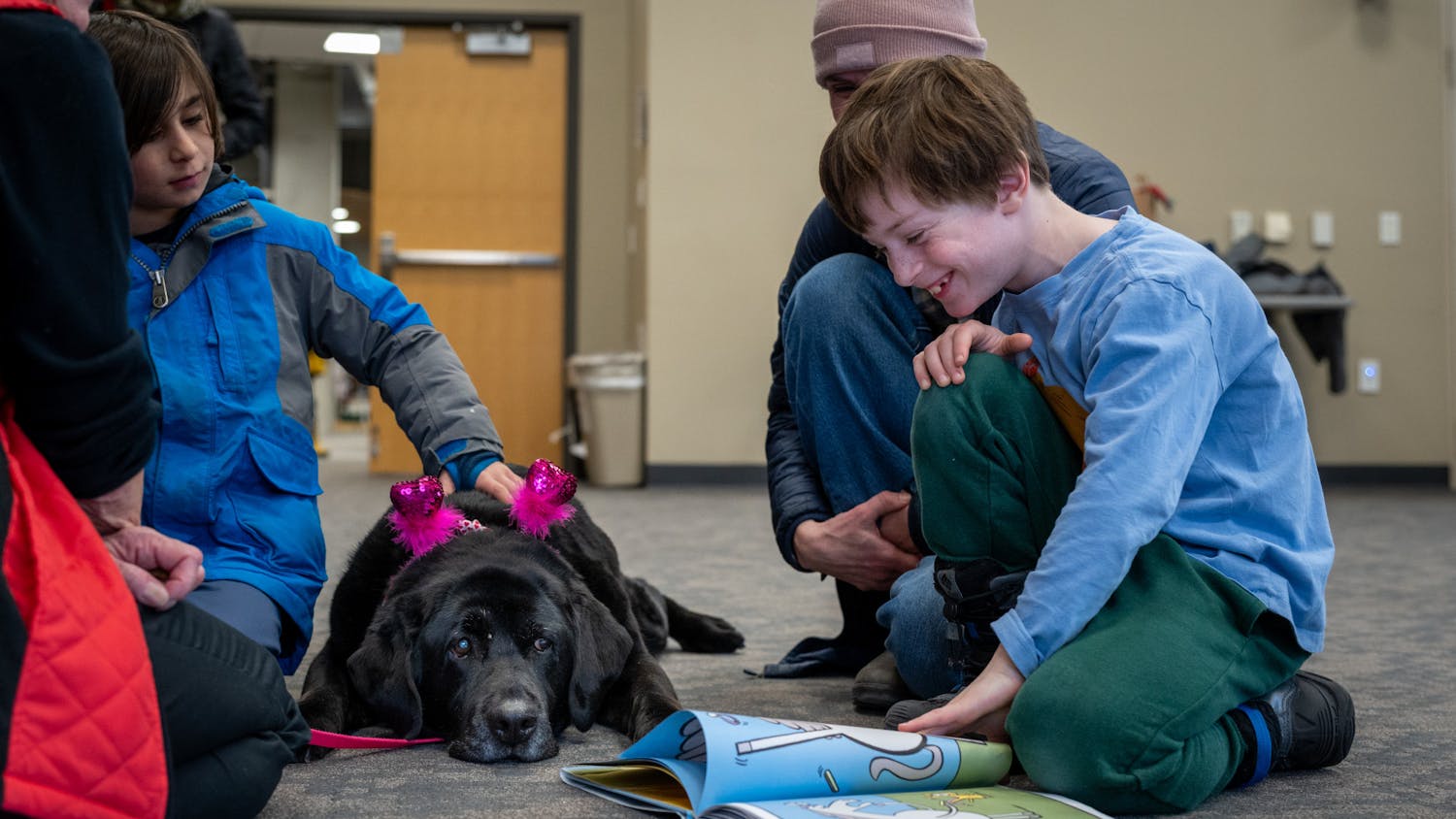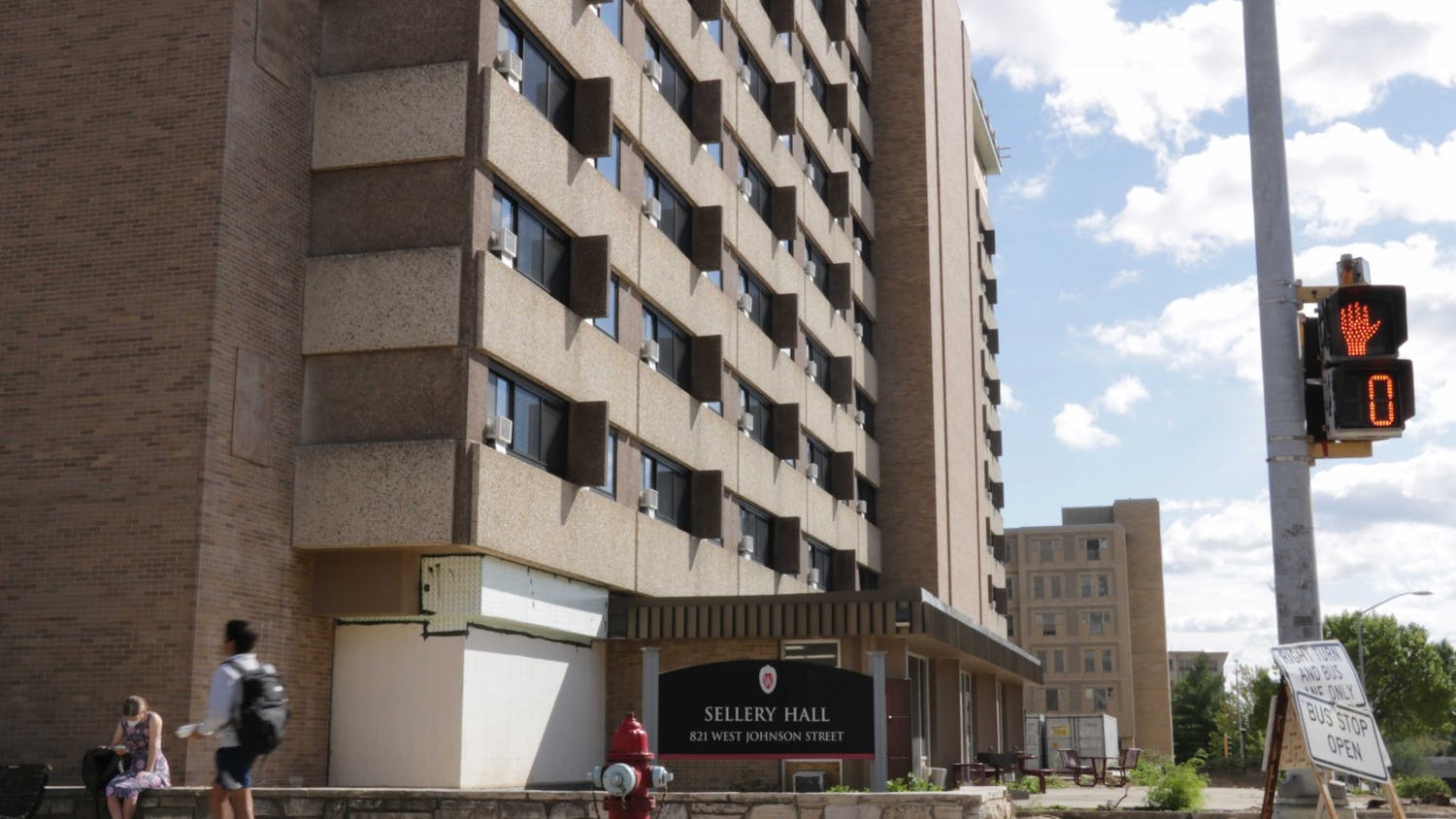Seven businesses on State Street sustained broken windows after Halloween revelers turned violent for the second year running, despite intensive planning by police and city officials to avoid such a situation.
The damage forced one store, Tomboy Girl, 551 State St., to abandon the street permanently and cost the city more than $100,000 in security. Police issued 170 citations that night and made 13 physical arrests.
Police donned riot gear and sprayed the costumed crowd with pepper spray after a clot of aggression formed in front of the University Inn, 441 N. Frances St., about 3 a.m. Nov. 2. Members of the crowd body-slammed each other and threw rocks and cans through businesses' windows. Eye-witness accounts differed as to what started the commotion, but some claimed they saw Inn guests taunting the crowd from above the street, flashing and flipping off the crowd.
\At one point the crowd just stood chanting 'ri-ot, ri-ot,' like they wanted something to happen, like they wanted shit to go down,"" UW-Madison sophomore Jean Roberts said. Others blamed the crowd's restlessness on the end of the free concert sponsored by Madtown Productions around 1 a.m.
The next day Mayor Dave Cieslewicz and Assistant Police Chief Noble Wray held a press conference in front of the damaged stores and tried to explain what went wrong. Wray said he would not classify the disturbance as a riot, but said the city would follow up with meetings aiming to avoid a recurrence. For next Halloween, officials are considering measures like suspending bar time and holding more alcohol-free events.
A drawn-out contract struggle between the state and the Teaching Assistants' Association culminated in a two-day strike this spring that virtually shut down much of campus.
The brouhaha began February 2003, when a small but vocal group of teaching assistants stormed the state Capitol after the Legislature rejected a two-year contract between the state and the TAA.
By fall, negotiations revived. The TAA demanded domestic partner benefits, zero-cost health care and pay raises consistent with inflation. The state rejected these demands, saying TAs, like other state employees, would be required to pay health-care premiums. For single TAs, the cost would amount to $9 per month.
Unhappy with the proposal, the TAA took initial steps to organize a walk-out. Still, by early April, the state's offer remained unchanged.
TAA members voted April 19 overwhelmingly to accept a strike. The state then budged, proposing a 4.6-percent pay increase after the first year. TAs retorted with a two final offers, one of which continued to demand zero-premium health care but lower pay increases, the other of which agreed to pay health care but demanded higher raises.
When the state failed to respond, the TAA went on strike April 27. TAs encircled campus buildings and vocally encouraged students not to cross their union's picket line. Campus reaction was mixed. Many academic departments and professors cancelled classes and abnormally few undergraduates could be seen on campus. Still, a number of students attending classes said they felt harassed by the TAA's heckling.
After two days, much was left unresolved. The TAA decided not to withhold students' grades, but its contract remained far from viable. If continued negotiations fail to yield adequate results, TAs will continue to work under a contract that is already over a year expired.
As 2004 began, it looked as if renegade Vermont governor Howard Dean had the Democratic presidential nomination sewn up. But stumbles in Iowa and New Hampshire, along with widespread doubts about his electability, led to the nomination of Vietnam veteran and Sen. John Kerry, D-Mass.
Dean rose from out of nowhere to take the lead in the polls in late 2003. His strength was based on a major internet grassroots organization, which worked to get young people involved in the Dean campaign. He also managed to successfully channel the anger of many Democrats at President Bush into a call for action.
But as the first primaries approached, many thought Dean was too ""angry"" and too liberal to defeat Bush. Instead, they turned to Kerry and Sen. John Edwards, D-N.C., who became the front-runners after Iowa and New Hampshire.
For the first time in years, Wisconsin's primary was important in the nomination process. For a week in February, the state was were deluged with presidential candidates. Kerry, Edwards and Dean all fought to win Wisconsin, spending time and money in Madison in the process. Gen. Wesley Clark conceded to Kerry at the Red Gym on campus.
Feb. 15, Kerry won a narrow victory over Edwards, and Dean's poor showing caused him to drop out of the race. Edwards conceded defeat after losing a string of Southern primaries several weeks later.
The disappearance and subsequent ""rescue"" of UW sophomore Audrey Seiler made national news in late March and early April. But when her abduction turned out to be a hoax, she was charged with obstructing police officers.
Seiler disappeared from her apartment at The Regent Street Apartments, 1402 Regent St., March 27. Police, friends and family launched a massive search for Seiler that continued over the next four days.
Seiler was spotted March 31 by an office worker in the marshes near John Nolen Drive. Police brought Seiler to St. Marys Hospital, 707 S. Mills St., where she told them that she was abducted by a stranger at knifepoint. She added she had not been harmed, and said she believed the abduction may have been part of a gang initiation. Her family and friends were overjoyed to have her home.
As Seiler was interviewed further, her story began to unravel. Security footage from her apartment building showed her leaving alone when she disappeared, and similar tapes from a west side Target caught her purchasing the knife, rope, duct tape and Nyquil she said was used by her abductor.
When the police showed her this evidence, she broke down and recanted her story. Though she did not give a reason for her faked abduction, interviews with her friends and family portrayed her as an academic perfectionist under high stress who was having trouble with her boyfriend.
Acting Police Chief Noble Wray said police suspected Seiler's story may have been a hoax, but took her words as truth early in the investigation.
""It would have been a disservice ... to jump to conclusions,"" Wray said.
Seiler is currently working on a plea bargain to avoid trial for obstructing police officers.
After heated debate, the Madison City Council passed an ordinance to raise the city's minimum wage March 31.
The ordinance, drafted by Ald. Austin King, District 8, will raise the minimum wage from $5.15 per hour to $7.75 per hour. Workers who receive tips will get $3.88, as opposed to the current federal minimum wage of $2.13.
Ald. Mike Verveer, District 4, said the council's decision was one of the first of its kind in the nation.
Mayor Dave Cieslewicz introduced an alternative proposal one day before the City Council vote, which would have increased the span of time over which a raise would occur to make it easier on local business owners.
Tom Beach, owner of Pizzeria Uno, 222 W. Gorham St., said he backed the mayor's draft because it lowers the original wage requirement for tip workers.
However, King's draft did not delay the phase by two years.
Cieslewicz said minimum wage supporters need the backing of local businesses in case the state takes action against an increase.
""I expect that we will get another challenge from the state, another attempt to preempt our ability to have a local minimum wage,"" he said. ""If we can undercut the argument that small business is opposed to this I think that will go a long way.""
A group of UW-Madison students filed a class-action lawsuit against the Madison-Dane County Tavern League and 24 campus-area taverns March 24.
The suit was filed following a weekend drink specials ban the taverns voluntarily enacted in September, 2002. The ban limits drink specials after 8 p.m. on Fridays and Saturdays.
The lawsuit, which is still pending, says these bars violated the state and federal antitrust law, which states competitors cannot agree on how they will compete. In addition, the suit claims customers during the ban were victims of price-fixing.
One goal the plaintiffs hope to achieve through the suit is the return of money to customers who bought drinks at the bars during the ban.
Ald. Mike Verveer, District 4, participated in discussions of the ban and called the suit ""totally and unequivocally ludicrous.""
""[The ban] is the furthest thing from a conspiracy,"" he said.
The lawsuit came on the heels of a study released by Policy, Alternatives, Community and Education that reported the number of fights, aggravated batteries, assaults, liquor law violations and vandalism that increased during the ban.
A citywide ban on smoking in bars, restaurants and most other indoor public places is poised to go into effect July 2005 after a hotly contested 15-5 City Council vote April 21.
Supporters said second-hand smoke was a public health problem, while the opposition said businesses would suffer.
UW-Madison senior Emily Gunsberger said Madison is already handicapped accessible, and should be accessible to those who do not want to inhale second-hand smoke.
""Even though I believe [the ban] is well-intentioned, it is wrong because it will put us at a distinct competitive disadvantage,"" said David Soland, co-owner of the Cardinal Bar, 418 E. Wilson St.
Some amendments to the ban would have allowed smoking in bars after 10 p.m., or in bars that make more than 75 percent of their revenues from alcohol, but the council turned them down.
The council has gradually changed the city's smoking ordinance. In 2002, it passed a ban on smoking in restaurants that make more than half of their revenue from food, rather than alcohol, sales. Before that, smoking was banned in restaurants that made more than 66 percent of their revenues from food.
UW-Madison adopted a new Student-Athlete Discipline Policy this year, which made punishment more consistent for student athletes.
Athletes praised the policy in September for setting clear punishment guidelines and for serving as a deterrent to illegal behavior.
Still, some have questioned the policy's effectiveness and appeals process.
Freshman football player Ernest Mason, after being charged with assaulting his girlfriend in December and in April, successfully appealed his suspension and did not miss any games. Mason pleaded guilty to battery and other charges Monday and his suspension could again be reconsidered by the athletic board.
In February, sophomore basketball player Maurice ""Boo"" Wade was arrested on assault charges and suspended. Wade appealed the decision, won and returned to play after missing two games.
In March, sophomore football player Dwayne Smith was arrested on allegations of sexual assault. He too appealed his indefinite suspension, which was later modified to a five-practice suspension.
The details of the appeals for all players were not made public.
The policy sparked campus debate as to whether student athletes facing serious legal allegations should be allowed to continue to play.
With the addition of Nike as a UW-Madison product licensee in September, the Student Labor Action Coalition and the university's Labor Licensing Policy Committee considered enforcing a requirement that licensees disclose their workers' wages.
In November, the LLPC recommended to Chancellor John Wiley that all UW-Madison licensees disclose wages.
This undertaking would force 3,323 companies to disclose wages from factories in 47 countries.
In January, Wiley agreed to seek wage disclosure and by March the university sent letters to UW-Madison's 10 major licensees telling them disclosure would be mandatory.
SLAC members hoped to enforce a May 1 deadline to get the companies to agree to disclosure.
By May 1, only one company, Top of the World, agreed to disclosure. Another company, Gear for Sports, refused and the rest of the top 10 are undecided.
The Wisconsin Legislature took the first step this year toward a constitutional amendment banning same-sex marriage, despite opposition from Madison and university officials.
The Madison City Council resolved March 3 to support same-sex marriages and to encourage the Legislature to do the same.
A proposed amendment to Wisconsin's constitution that would prevent same-sex couples from marrying passed the Republican-dominated state Assembly and Senate March 5 and 12, respectively.
To become law, it will have to pass both houses and a statewide referendum next year.
The Assembly's 68-27 vote came after 13 hours of debate, including a filibuster by Rep. Mark Pocan, D-Madison, who listed Wisconsin cities in alphabetical order and said issues such as health care and jobs mattered more to each city than banning same-sex marriage. The Senate convened an ""extraordinary session"" after its regular floor period expired, passing the measure 20-13.
UW-Madison students and faculty joined the fray in April. The Faculty Senate voted April 6 to formally oppose the amendment. Hundreds of students attended a debate the next day at the Memorial Union.
The debate will begin anew when the Legislature reconvenes in January.





